Gary Ackerman facts for kids
Quick facts for kids
Gary Ackerman
|
|
|---|---|
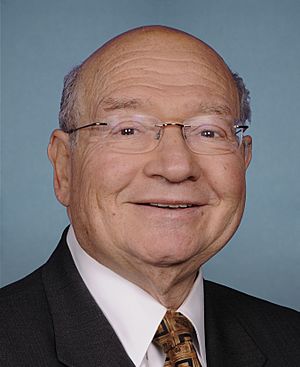 |
|
| Member of the U.S. House of Representatives from New York |
|
| In office March 1, 1983 – January 3, 2013 |
|
| Preceded by | Benjamin S. Rosenthal |
| Succeeded by | Grace Meng (redistricting) |
| Constituency | 7th district (1983–1993) 5th district (1993–2013) |
| Member of the New York Senate from the 12th district |
|
| In office January 1, 1979 – March 1, 1983 |
|
| Preceded by | Jack E. Bronston |
| Succeeded by | Leonard P. Stavisky |
| Personal details | |
| Born |
Gary Leonard Ackerman
November 19, 1942 Brooklyn, New York City, U.S. |
| Political party | Democratic |
| Residences | Roslyn Heights, New York, U.S. |
| Alma mater | Queens College (BA) |
| Occupation | High school teacher, newspaper publisher |
Gary Leonard Ackerman (born November 19, 1942) is an American politician who used to be a U.S. representative for New York. He served in Congress from 1983 to 2013. He is a member of the Democratic Party. In 2012, Mr. Ackerman announced he would retire after serving fifteen terms.
Contents
Early Life and Education
Gary Ackerman was born in Brooklyn, New York City, in 1942. His parents were Eva and Max Ackerman. His grandparents came to the U.S. as Jewish immigrants from Russia and Poland. He grew up in Flushing, Queens.
He went to public schools in the area, including Brooklyn Technical High School. He then graduated from Queens College in 1965.
Early Career
After college, Mr. Ackerman became a teacher in New York City. He taught social studies, math, and journalism to middle school students in Queens.
In 1969, after his first child was born, Mr. Ackerman asked for time off from his teaching job to care for his baby. At that time, only mothers were allowed to take unpaid leave for childcare. Mr. Ackerman took legal action against the school board. He won his case, which helped establish the right for either parent to take unpaid leave for childcare. Years later, as a congressman, he helped pass the Family and Medical Leave Act of 1993. This law allows workers to take time off for family or medical reasons.
In 1970, Mr. Ackerman started a weekly newspaper in Queens called The Flushing Tribune. It later became the Queens Tribune. He worked as its editor and publisher.
Serving New York State
Gary Ackerman was a member of the New York State Senate from 1979 to 1983. This is part of the state government that makes laws for New York.
Serving in the U.S. House of Representatives
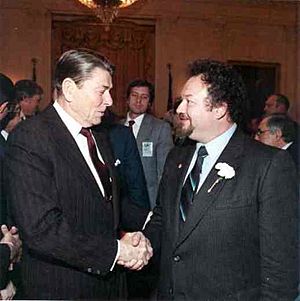
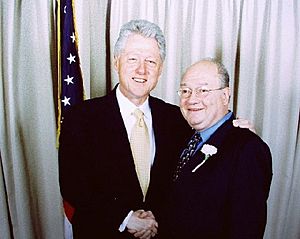
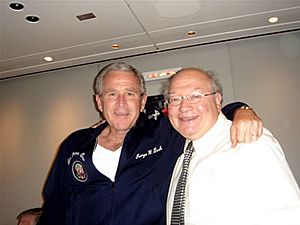
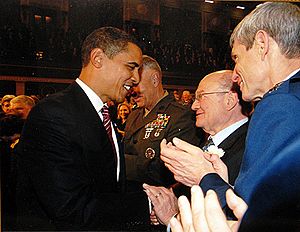
Mr. Ackerman became a U.S. Representative in 1983. He won a special election to fill a vacant seat. He was re-elected many times, serving a total of fifteen terms. He represented New York's 7th district and later the 5th district after boundaries changed.
In March 2012, Mr. Ackerman announced that he would retire from Congress. His last day in office was January 3, 2013.
Key Roles and Awards
As a congressman, Mr. Ackerman was a delegate for the U.S. Congress to the United Nations. He was also a leading Democrat in the Congressional Caucus on India and Indian Americans. In 2002, he received the Padma Bhushan award from India. This is one of India's highest civilian awards, given for his work to improve relations between the U.S. and India.
He was also a member of the Congressional Cuba Democracy Caucus. This group supports democracy in Cuba. He also led the International Council of Jewish Parliamentarians (ICJP).
Important Laws and Efforts
Mr. Ackerman worked on many important laws and issues during his time in Congress.
Health and Safety
- Newborn HIV Testing: He helped pass a law that required HIV testing for newborns. This law also made sure that mothers were told the results. Before this, many states tested babies but did not share the results with parents. This meant thousands of mothers did not know their children had tested positive for HIV.
- Food Safety: He worked for ten years to ban the sale of meat from sick or injured animals. He warned that this practice was not only cruel but could also lead to diseases like Mad Cow disease. His efforts led to a ban on such meat in 2003.
- Cancer Screening: He was successful in getting Medicare to cover testing for prostate cancer.
- Driving Safety: He sponsored the first federal law to ban using handheld cell phones while driving.
Financial Protections
- Credit Reports: A law he supported requires banks to tell people when negative information is added to their credit reports.
- Company Audits: After major company scandals like Enron, he sponsored a law. This law stops accounting firms from advising companies they are also checking for accuracy. This helps prevent conflicts of interest.
- Financial Crisis: In 2008, he voted for the Troubled Asset Relief Program. This program helped stabilize the U.S. financial system during a crisis.
- Stock Market Rules: In 2009, he introduced a bill to bring back the uptick rule. This rule limits when traders can sell stock they don't own, which helps prevent stock prices from falling too quickly.
- Madoff Scandal: He questioned officials from the SEC about how they handled tips about the Bernie Madoff investment fraud. He believed the public needed to trust that complaints would be taken seriously.
Foreign Policy and Security
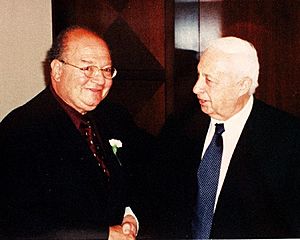
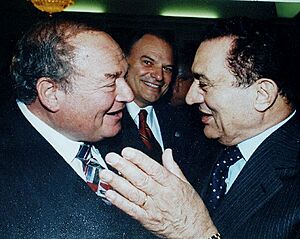
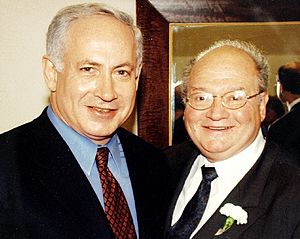
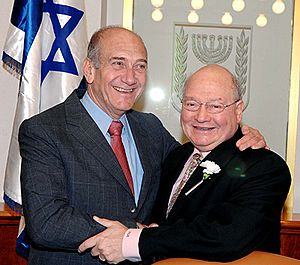
- Iraq Invasion: In 2002, Mr. Ackerman voted to allow the invasion of Iraq.
- Soldier Pay: He convinced the Defense Department to stop taking money from the wages of some U.S. soldiers serving in Iraq. These soldiers were supposed to be exempt from federal taxes because they were in a combat zone.
- Palestinian Authority: He wrote a law that required President George W. Bush to place sanctions on the Palestinian Authority. This was because they were not following peace agreements.
- North Korea: In the 1990s, he traveled to North Korea to discuss preventing the spread of nuclear weapons. He was the first person since the Korean War to cross the DMZ (Demilitarized Zone) into South Korea.
- Human Rights: He helped pass a law that stops war criminals and people who have committed genocide, torture, or terrorism from entering the U.S. It also allows for the deportation of those who have entered.
- Holocaust Survivors: He convinced the German government to create a fund of US$110 million to pay 18,000 Holocaust survivors.
- Humanitarian Aid: Mr. Ackerman was known for his efforts to help feed starving people in Ethiopia and the Sudan. He also played a big part in helping Ethiopian Jews move to Israel. He met with leaders in the Middle East to work towards peace.
- September 11 Attacks: He helped create the "Heroes" postage stamp. The money from this stamp helps families of rescue workers who were killed or seriously injured during the September 11 attacks. He also pushed for federal funds for New York after the attacks.
Local Issues
- Guide Dogs: Mr. Ackerman helped change a law in Hawaii that stopped blind people from bringing their guide dogs to the islands.
- West Nile Virus: He led an investigation into how New York City and Long Island officials used spraying to fight the West Nile virus outbreak. He also got federal money to help prevent the virus from returning.
Committee Work
Mr. Ackerman served on several important committees in the House of Representatives:
- Committee on Financial Services
- Committee on Foreign Affairs
He was also part of the Congressional Arts Caucus and the Congressional Caucus on India and Indian Americans.
Personal Life
Gary Ackerman is known for wearing a white carnation boutonnière every day. He lives in Roslyn Heights with his wife, Rita. They have three children: Lauren, Corey, and Ari.
Mr. Ackerman enjoys photography, collecting stamps, and boating. He is also an Eagle Scout. In 2006, he was chosen to lead the International Council of Jewish Parliamentarians (ICJP). He was also made an honorary graduate of the United States Merchant Marine Academy for his support of the school. There is also a street named after him in Central Islip, New York.
See Also
- List of Jewish members of the United States Congress

